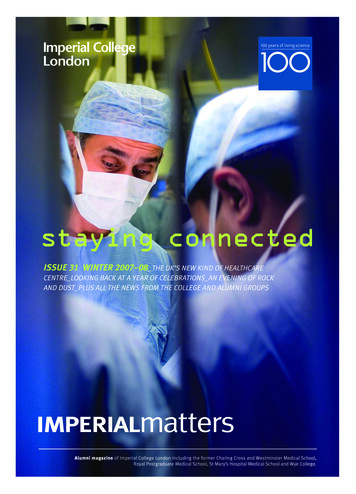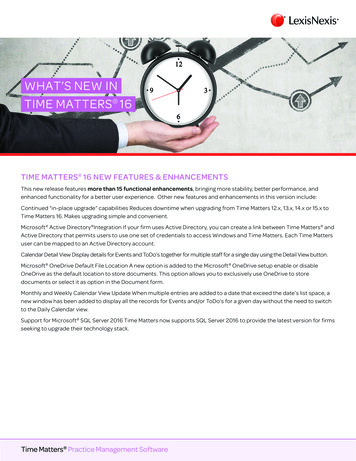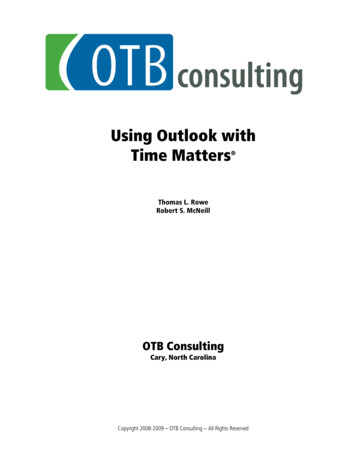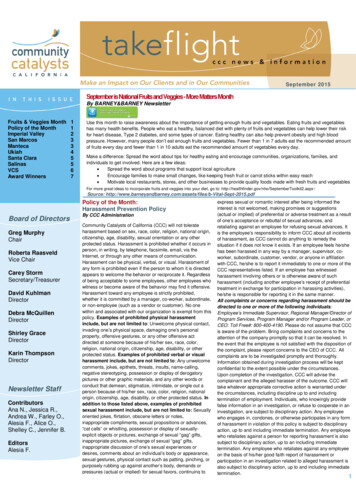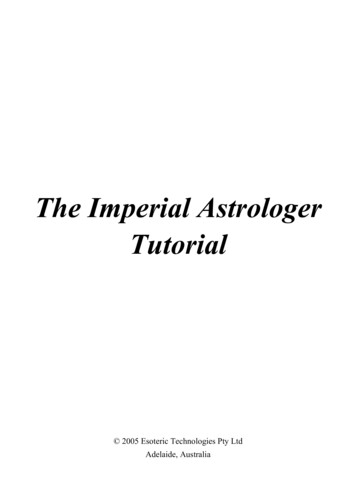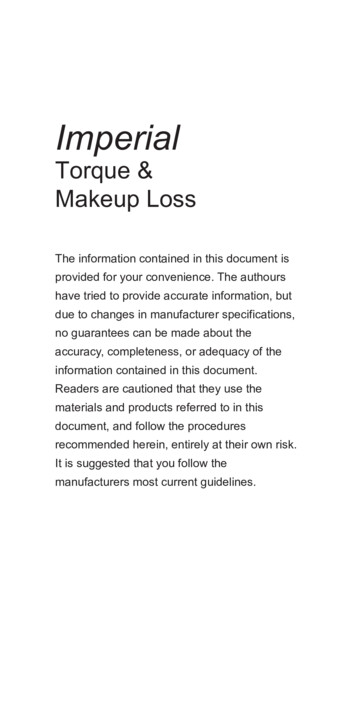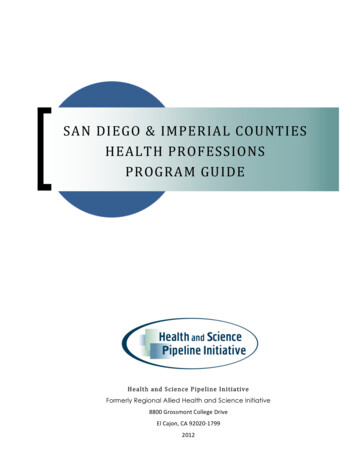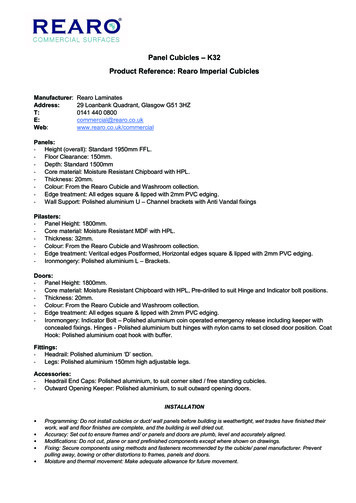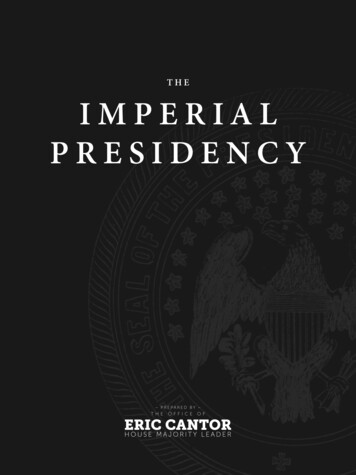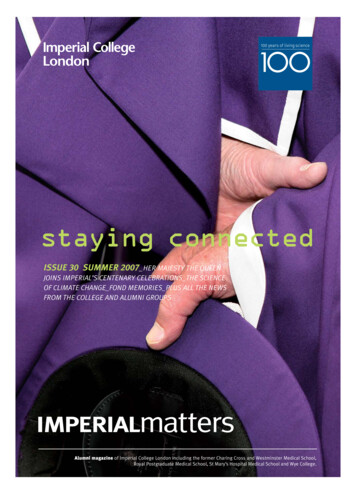
Transcription
Imperial Matters 30 QX31/8/0714:39Page 37headISSUE 30 SUMMER 2007 HER MAJESTY THE QUEENJOINS IMPERIAL’S CENTENARY CELEBRATIONS THE SCIENCEOF CLIMATE CHANGE FOND MEMORIES PLUS ALL THE NEWSFROM THE COLLEGE AND ALUMNI GROUPSIMPERIALmattersAlumni magazine of Imperial College London including the former Charing Cross and Westminster Medical School,Royal Postgraduate Medical School, St Mary’s Hospital Medical School and Wye College.
Imperial Matters 30 QX22/9/0712:19Page 34ISSUE 30 SUMMER 2007in this issue .1114161720REGULAR FEATURES26ASSOCIATION1editorial by Sir Richard Sykes22 alumni group news2letters24 international group news26 alumni focusNEWS30 media mentions3Imperial news314faculty news32 in memoriambooks33 honoursFEATURES11a royal occasion royalty gathers to celebrate Imperial’s Centenary14the environmental evangelist Sir David King speaks about his role as Chief Scientific Adviser toHM Government16looks can be deceiving solving Lake Victoria’s water hyacinth problem17securing a global future the Grantham Institute for Climate Change leads the way forward20 a trip down memory lane celebrate 100 years with 100 storiesEXCLUSIVE ONLINE FEATURESinventor’s corner Imperial’s enterprising academicsfarewell to the University of London looking to the future as an independent institutionIMPERIALmattersPRINTED ON 100 PER CENT RECYCLED PAPER. REVIVE 100 FIBRES ARE SOURCED FROM 100 PER CENTPOST CONSUMER WASTE AND THE PULP IS BLEACHED USING A TOTALLY CHLORINE FREE PROCESS.PRODUCED BY THE OFFICE OF ALUMNI AND DEVELOPMENT AND IMPERIAL COLLEGE COMMUNICATIONSEDITOR ZOË PERKINSMANAGING EDITOR SASKIA DANIEL AND JON ASHTONEDITORIAL CONTRIBUTORS LIZ GREGSON AND IMPERIAL COLLEGE PRESS OFFICEDESIGN JEFF EDENPRINT PROLITHO LTDDISTRIBUTION PHAROS INTERNATIONALFRONT COVER: NEVILLE MILESIMPERIAL MATTERS IS PUBLISHED TWICE A YEAR. THE NEXT ISSUE WILL BE PUBLISHED IN JANUARY 2008AND THE COPY DEADLINE IS FRIDAY 9 NOVEMBER 2007.ADDRESS FOR MAGAZINE ENQUIRIES:ZOË PERKINS, OFFICE OF ALUMNI AND DEVELOPMENT, IMPERIAL COLLEGE LONDONSOUTH KENSINGTON CAMPUS, LONDON SW7 2AZz.perkins@imperial.ac.uk IMPERIAL COLLEGE LONDON, 2007. ALL RIGHTS RESERVED.27
Imperial Matters 30 QX31/8/0714:37Page 1JAN CHLEBIK, NEVILLE MILES, COLIN WHYMAN, CHERYL APSEE, NAOMI WESTONeditorialDEAR ALUMNUSWelcome to the summer 2007 edition of your magazine,Imperial Matters.As I write, we are over halfway through our Centenary year,having celebrated our official birthday on 9 July in the presenceof Her Majesty The Queen and His Royal Highness The Duke ofEdinburgh. This was a day that belonged to everyone who hasworked or studied here in the last century, and was one of thehighlights of a year-long series of events that have commemorated100 years of living science.Our celebrations on 9 July not only paid tribute to our heritage,but also heralded the beginning of a new era for Imperial, as webecame independent of the University of London. The College’s newCharter was presented by Her Majesty, enabling us to award the firstImperial College degrees to five honorary graduates. This specialceremony can be viewed online at www.imperial.ac.uk/Centenaryand you can read more about the visit on page 11.What strikes me most about all of our celebrations so far is thesense of community that they have invoked amongst Imperialpeople – staff, students, alumni and friends have joined togetherall around the world. We hope that another highlight for ouralumni community will be the 2007 Alumni Reunion on 14–16September, for which over 650 alumni and guests have bookedso far. Turn to page 28 to find out more.Events this year have not been confined to Imperial’s campuses;alumni groups around the world have joined the College incommemorating its one hundredth birthday, welcoming Collegerepresentatives to all corners of the globe. Read more in updatesfrom our alumni groups on pages 22–25.While our Centenary celebrations are an important focus for2007, the day-to-day business of what we do at Imperial does notslow. In this issue you can find out about Imperial’s role in thepioneering development of the UK’s first Academic Health ScienceCentre, as well as the role of Imperial Professor Tejinder Virdee inthe world’s largest experiment, currently in preparation at CERNin Switzerland. News from the college and all of our faculties isfeatured on pages 3–10.One of Imperial’s strengths over its first 100 years has beenthe ability to change and respond to the challenges of the times.Important innovations and breakthroughs are increasingly foundwhere researchers of different specialisms work in partnership.Imperial’s new Grantham Institute for Climate Change is a primeexample of this approach and you can find out more on page 17.Also in this issue, we have spoken to alumni around the worldwho are making a difference in the area of the environment.One of those interviewed is Sir David King, Chief Scientific Adviserto HM Government since 2000. We are delighted that Sir David hasagreed to be the keynote speaker at the 2007 Alumni Reunion andlook forward to welcoming him back to the College in September.Issue eight of building the connection, our fundraisingnewsletter, is enclosed with your copy of Imperial Matters. As Isign off, I would like to acknowledge and thank all of our generoussupporters who are helping to enrich the lives of students atImperial through your gifts to the Annual Fund.Our students are the lifeblood of the College, coming from manydifferent cultures all over the world to learn and discover. As youdid before them, they entrust us with their time, their talent andtheir energy, and I thank you for your support in helping us to fulfilthis responsibility.IMPERIAL MATTERS SUMMER 2007 1
Imperial Matters 30 QX31/8/0714:37Page 2lettersThe story behind the pictureIt was a great privilege to have one of my photographs on the cover ofthe last issue of Imperial Matters (issue 29)! The guy in the photo wasthe head barman at the time, Brendan Clements, who ran an‘institution’ throughout the seventies – with many an internal battlebetween the competing College bars of Southside (Stan’s Bar), CollegeBlock (Alan’s Bar) and of course the Union– the only real bar.I worked in all of them during my timeand the ‘bar birthdays’ were one of themany annual events to add to the cultureof the day.My name can be found on at leastthree of the Union tankards, being insecond place on my most prized – theHolbein Award for Sport of the Year. I wasone of that elite crew who got elected to aUnion position (City and Guilds Vice-President 1974–75), however aminor contretemps with the examiners did not permit that to happenand full-time Union bar work followed. The photo was taken duringthis period when I was working there full-time in early 1975.COLIN WALDRON (Civil and Environmental Engineering 1975)Commemoration Day celebrationsRecently I have been reading the notes about the College’s Rectors inthe last issue of Imperial Matters (Imperial’s leading men, issue 29).I was rather surprised that in the notes concerning Sir Roderic Hill,2 IMPERIAL MATTERS SUMMER 2007no mention was made of the fact that it was he whoinstituted the College’s Commemoration Day.He felt that graduates and postgraduates shouldhave their own presentation ceremony rather thanbeing somewhat lost amongst the hundreds ofstudents attending the University of Londonceremony, so he set up a committee to organise theday. I was Chairman of the Imperial College Unionentertainments committee at the time and was given the task ofarranging a Commemoration Ball for the evening.Notice was short and I had difficulty finding a suitable venue, buteventually I was able to book the ballroom at Claridge’s Hotel and thefirst Commemoration Day ceremony took place in 1950. The ballroomat Claridge’s was small and many more people wanted to attend theball than we were able to accommodate, so as soon as the date for thenext Commemoration Day was set I booked the Great Room at theGrosvenor House Hotel with music provided by Sidney Lipton and hisorchestra. From then on I hope the event has gone from strength tostrength, but it was all due to the enthusiasm of Sir Roderic Hill.REGINALD GILL (Electrical Engineering 1951)Please send your letters to: Imperial Matters, Office of Alumni and Development,Imperial College London, South Kensington Campus, London SW7 2AZor by email to matters@imperial.ac.uk.We reserve the right to edit for length. Unless you specify otherwise, letters mayalso appear on the Imperial College alumni website as part of the online editionof Imperial Matters. Please note that any views expressed here are those of thecontributors and do not necessarily reflect those of Imperial College London.
Imperial Matters 30 QX31/8/0714:37Page 3Imperial news CollegeJAN CHLEBIKProfessor Sir Roy Andersonnamed next Rector ofImperial College LondonProfessor Sir Roy Anderson (Zoology 1968, PhDParasitology 1971), a distinguished epidemiologist andcurrently Chief Scientific Adviser to the UK Ministry ofDefence, will succeed Sir Richard Sykes to become thefourteenth Rector of Imperial College London. Sir Roy willtake over from Sir Richard in the summer of 2008, whenSir Richard retires after leading Imperial for eight years.The Chairman of Imperial’s Council, Lord Kerr of Kinlochard, led theinternational search for its new Rector. Lord Kerr said: “Imperial is a worldclass research university, and demands a leader with vision, determinationand experience, as well as a thorough understanding of the environmentin which it operates. Sir Roy more than matches these criteria.”Sir Roy, 60, has spent much of his career at the College, becomingone of its youngest professors in 1982 at the age of 35. He has heldImperial’s Chair in Infectious Disease Epidemiology since 2000 and isregarded as one of the world’s leading authorities on the epidemiologyand control of infectious diseases.Sir Roy said on his appointment: “I’ve always had a special affinitywith Imperial and am very excited about taking on this new andchallenging role. I hope that in my time as Rector I will be able to doas much as Sir Richard to build on all the great achievements ofImperial’s first 100 years.”Read more about Sir Roy’s appointment as the next Rector ofImperial College at nary campaign toraise 207 millionImperial College marked the launch of its Centenary year with acampaign to raise 207 million from philanthropic donations by2010. Thanks to the generosity of alumni, industrial associates, andtrusts and foundations, the College has already raised 136 million.This funding will provide scholarships for gifted students, with over 15 million already raised for this; a further 74 million has beendonated to contribute to building and refurbishment projects acrossImperial’s campuses; and 47 million has been donated to support theCollege’s mission to develop its academic activities to meet the needsof society, industry and healthcare. Donations to the alumni-supportedStudent Opportunities Fund alone have so far been translated intoscholarships for 42 undergraduates and 18 postgraduates.Other concrete results of the campaign will include a majorredevelopment of the Imperial College Union Building and the ongoingtransformation of the Central Library into a high-tech space providing24-hour computing facilities and wireless information access zones.Rector Sir Richard Sykes says: “The Centenary campaign is a criticalpart of maintaining Imperial’s ability to be master of its own destiny.From the discovery of penicillin to new treatments for rheumatoidarthritis, we have a long history of making breakthroughs that improvecountless lives, but this is only possible when we have the financialfreedom to set our own priorities. The campaign will also be vital inensuring that our next scientific trailblazers are not deterred from takingadvantage of a world-class education by financial considerations.”Imperial wins Best ofBritish Award for supportingUK industryImperial’s vital role in the UK’s industrial and economic success wasrecognised at the inaugural Best of British Industry Awards in February.The College received the Supporter of British Industry Award, whichhonours organisations that proactively engage with industry and provideit with resources and support that make a demonstrable difference.Imperial was founded with the mission of applying its scientificresearch to industry, a principle to which the College remains stronglycommitted, according to the Rector, Sir Richard Sykes. He says: “Strongpartnerships between industry and universities are win-win for bothparties, and are also vital for the UK’s economy, so I’m very pleased thatour commitment to forging relationships has been recognised in this way.Places like Imperial are real powerhouses of expertise and innovation, andit is funding we receive from our industrial partners that helps us to makethe breakthroughs. They in turn are able to share the financial benefitswhen our ideas make it out of the lab and into the market place.”With around 30 million a year in industrial research funding,Imperial has a strong track record in working with industry throughcollaborative research and consultancy.Current successful partnerships include the Imperial–BP UrbanEnergy Systems project, which explores ways to improve the efficiencyof cities, and the Systems Biology Industry Club, which fostersrelationships between researchers and industrial partners with aninterest in systems biology. NEWS IN BRIEF NEWS IN BRIEF NEWS IN BRIEF NEWS IN BRIEF NEWS IN BRIEF NEWS IN BRIEF NEWS IN BRIEF NEWS IN BRIEF NEWS IN BRIEF New podcast offers monthlyslice of life at ImperialProfessor of Surgery namedParliamentary Under SecretaryDancing the night away atthe Centenary Ball Over 2,500Strengthening academic linksbetween Imperial and ChinaAvailable on the first working day ofevery month, the new Imperial Collegepodcast supplies a roundup ofImperial’s latest news, findings andevents, providing listeners with a tasteof life at the College and the scientificand academic work it carries out.Imperial’s podcast, which ispresented by Gareth Mitchell, alecturer on Imperial’s ScienceCommunication MSc, can bedownloaded at sts.Professor the Lord Ara Darzi, whocurrently holds the Paul Hamlyn Chairin Surgery and is Head of the Divisionof Surgery, Oncology, ReproductiveBiology and Anaesthetics in theFaculty of Medicine, was appointedas Parliamentary Under Secretary inthe Department of Health.Lord Darzi is widely recognised asone of the UK’s leading surgeons in thefield of minimally invasive and robotassisted surgery, and helped developvirtual reality training methods allowingsurgeons to practice their skills.students, staff and alumni dancedthe night away at the ImperialCollege London Centenary Ball inJune. “It was completely sold out,”said organiser Jon Matthews,Imperial College Union DeputyPresident for Finance and Services.Highlights of the night includedX-Factor contestants performing inthe College’s Great Hall, a funfair andfireworks on the Queen’s Lawn, anda casino in the Beit Quadrangle.Two new Memoranda of Understandinghave been signed with universities inChina, with the aim of developingacademic collaborations.Imperial and Shanghai Jiao TongUniversity’s academic affiliation willallow postdoctoral researchers andgraduate students to train at bothuniversities. Imperial and the TsinghuaUniversity in Beijing will focus onacademic collaboration through theexchange of staff and students, andwill explore future possibilities forjoint cooperative research projects.IMPERIAL MATTERS SUMMER 2007 3
Imperial Matters 30 QX31/8/0714:37Page 4Imperial news EngineeringRALPH HODGSONJohn Wood named nextFaculty PrincipalProfessor John Wood, who is currentlyChief Executive of the Council for theCentral Laboratory of the ResearchCouncils (CCLRC), will succeed ProfessorDame Julia Higgins as the next Principalof the Faculty of Engineering.Welcoming his appointment asPrincipal of the Faculty, Professor Woodsaid: “I believe that engineering is a keycomponent for solving many of thechallenges facing our society. Imperial is one of the few institutionsworldwide that has the strength and depth in engineering and relatedsciences to be a significant player in helping to deliver sustainablesolutions to these challenges. I look forward to consolidating andbuilding on this reputation and making sure Imperial continues toinfluence international policy and activity by engaging with all keydecision makers.”Professor Wood has a strong background in engineering, with acareer encompassing numerous public and industrial appointmentsin the UK and worldwide. He is a Fellow of the Royal Academy ofEngineering and Chair of the European Strategy Forum for ResearchInfrastructures. He joined the CCLRC in 2001 on secondment from theUniversity of Nottingham, where he was Cripps Professor of MaterialsEngineering, Head of Department and Dean of Engineering.Imperial’s Rector Sir Richard Sykes said: “This is the biggestacademic engineering job in the UK and it demands enormousunderstanding of the environment in which all facets of this wideranging discipline are operating. I’m delighted that in John we havebeen able to attract one of the world’s most influential professionalengineers, with the stature necessary to represent this internationallyleading faculty on the world stage.”Super-fridge to help improvelives in developing countriesAn all-in-one cooker, energy generator and fridge could soon beimproving quality of life in developing countries. The 2 million Stovefor Cooking, Refrigeration and Electricity (SCORE) project aims to workwith rural communities in Africa and Asia, where access to power islimited, to develop a versatile domestic appliance powered by biomass,which will significantly improve health and welfare. It is hoped that thedevice will also promote economic growth and reduce poverty byenabling communities to take ownership of its development andestablish businesses for its manufacture, repair and application.The project is a collaboration between several UK universities, LosAlamos National Laboratory, GP Acoustics and the charity PracticalAction. Ron Dennis and Dr Keith Pullen, Department of MechanicalEngineering, are leading Imperial’s side of the project.Dr Pullen said: “Heat, refrigeration and energy form the basis of adecent quality of life, from storing medicines at the righttemperature to improving access to education throughelectricity for computers and lighting. But what’s soimportant about this project is that we are working inpartnership with people to work out what’s possibleand develop something sustainable based on the skillsand the raw materials available locally.”The electricity-generating and refrigerating aspectsof SCORE will be operated through thermoacousticprinciples, which convert sound waves into heat and vice versa. DrPullen added: “Using this technology while ensuring that the device isrelatively low-cost and can be produced using local materials andlabour is one of the great challenges of this project.”‘Snowball Earth’ theoryout in the coldUsing a technique known as the chemical index of alteration, a teamfrom the UK and Switzerland have examined the chemical and mineralcomposition of glacial sedimentary rocks in Oman. They have producedclear evidence of hot–cold cycles in the Cryogenian period, roughly850–544 million years ago, challenging the ‘Snowball Earth’ theory thatEarth once underwent a prolonged time of extreme global freezing.Researchers found three intervals that indicated pulses of coldclimate; however, these intervals alternate with periods of high ratesof chemical weathering of contemporary land surfaces. This causesrocks to quickly decompose and is enhanced by humid or warmconditions, and means that despite the severe glaciation, a completedeep-freeze never took place, and that some areas of open, unfrozenocean continued to exist.Professor Philip Allen, Department of Earth Science and Engineering,explains: “If the Earth had become fully frozen for a long period of time,these climatic cycles could not exist – the Earth would have changedinto a bleak world with almost no weather, since no evaporation from NEWS IN BRIEF NEWS IN BRIEF NEWS IN BRIEF NEWS IN BRIEF NEWS IN BRIEF NEWS IN BRIEF NEWS IN BRIEF NEWS IN BRIEF NEWS IN BRIEF ABB–Royal Academy ofEngineering Research Chairlaunched Professor Nina Thornhilltook up the post of Chair in ProcessAutomation, which is sponsored byengineering company ABB under theRoyal Academy of EngineeringResearch Chairs Scheme, in May2007. Professor Thornhill said: “A keyaim of the research is to ensure thattechnical solutions for specific casestudies evolve into best practices inautomation to reduce energyconsumption, boost productivity andreduce wastes.”4 IMPERIAL MATTERS SUMMER 2007Imperial College London andRoyal Dutch Shell join forcesEducating the engineers of thefuture EnVision 2010, a project toThe Shell Imperial Grand ChallengeProgramme on Clean Fossil Fuels,a new multi-million pound jointresearch programme betweenImperial College London and RoyalDutch Shell plc, will focus ondeveloping processes that willenhance extraction of difficulthydrocarbons with minimal releaseof greenhouse gases. It will examineprocesses from the extractionstage through to downstreamdelivery of energy and chemicals tothe consumer.maintain and enhance Imperial’sposition as an international leader inengineering education, has movedinto its next phase. Faculty PrincipalDame Julia Higgins invited academicsfrom across the Faculty to submitproposals to enhance and developImperial’s engineering undergraduateeducation. It is hoped that a numberof the successful schemes will betaken forward by the EnVision teamduring this academic year, of whichRacing Green will be the first. Readmore next.Racing Green The first prototype ofImperial’s Racing Green cart was onshow at the Institute of MechanicalEngineers’ parliamentary reception inApril 2007. Students and staffattended the reception to showcasetheir energy efficient electric cart,part of the Racing Green project todesign, build and race a zeroemission electric hybrid fuel cellracing car. The team took part in theFormula Zero Championships, whichpromotes zero emissions technologiesthrough racing with cars powered byfuel cells.
Imperial Matters 30 QX31/8/0714:37Page 5Imperial news Engineeringthe oceans could take place, and little snowfall would be possible.”Professor Allen adds that understanding how Earth’s climate haschanged in the past provides important data for current climate changemodels. He says: “We are living in a time of climate change and there isa huge debate going on over what the natural variability of the climateis. Knowledge of climate change in deep time provides clues to the wayin which our climate system works under extreme conditions.”An answer to theenergy crisis?Harvesting solar energy to produce renewable, carbon-free and costeffective hydrogen as an alternative energy source is the focus of anew 4.2 million research programme at the College’s Energy FuturesLab funded by the Engineering and Physical Sciences ResearchCouncil (EPSRC).The five-year programme will develop both biological and chemicalsolar-driven processes to develop renewable and cost-effectivemethods of producing hydrogen which can be used to operate fuelcells, electrochemical devices that can convert hydrogen to electricityand heat. Professor Nigel Brandon, Principal Investigator on theproject and Director of the Energy Futures Lab, said: “The successfulproduction of solar energy-driven renewable hydrogen could transformthe supply of carbon-free fuel and make an enormous impact on theviability of hydrogen as an energy carrier. In addition, it will be anessential step on the route to fully exploiting fuel cell technology. Itwill position the UK as a world leader in one of the very few solutionsto a truly sustainable energy future.”The project will culminate in the design, building and operation of aworking prototype system, with the aim of demonstrating that solarenergy can be directly harvested to produce hydrogen and, in turn,cost-effective electricity and heat.Royal Academy ofEngineering award successOne of Imperial College London’s first successful spin out companies,Process Systems Enterprise, has won the Royal Academy ofEngineering’s MacRobert Award, the UK’s most prestigious prize forinnovation in engineering.The company’s innovative software, gPROMS , helps process-industry companies to maximise product quality, minimise productioncost and control environmental impact through the use of highaccuracy predictive mathematical models of their processes.The Royal Academy of Engineering has also awarded the ERAFoundation Entrepreneurs Award to Imperial bioengineering PhDstudent Mario Iobbi, for his idea and business plan for a SaturationDriven Oxygen Therapy (SDOT) device. This new respiratory device willhelp sufferers of emphysema, cystic fibrosis and other breathing-relatedconditions by automatically adjusting the flow of oxygen to a patientaccording to their needs, rather than having a fixed flow of oxygen.Two members of staff were awarded the Royal Academy ofEngineering’s Silver Medal in June 2007; they are listed on page 33.Two members of staff and three alumni were elected as Fellows of theRoyal Academy of Engineering in July 2007; they will be listed in issue 31of Imperial Matters.Chasing the sunThomas Middleditch, Peter Huthwaite, Chris Burrows and Oliver Carson,four undergraduate Mechanical Engineering students, are designing,making and testing a solar powered boat, called Solar Spirit, tocompete in the Frisian Solar Challenge in the Netherlands. The 220kilometre, six-day race is the only solar powered boat race in Europe.Made of glass fibre, the one-man boat will be powered by five 175Watt solar panels and will be six metres in length. An electric outboardmotor will source its power from a combination of solar and batterypower through the course of the challenge, depending on the lightconditions and racing strategy. The batteries will be charged usingpower from the solar panels but not necessarily during the racingphase of the day.Although in an unfinished state, the team hit the water for the firsttime at the Beale Park Thames Boat Show in June 2007, reaching aspeed of 6.3 miles per hour. “The boat turned easily, was very stableand had low resistance,” explained Oliver. “We were very pleased withthe boat’s performanceand hope at the actualrace next year we willhave optimised themotor and have thepotential to gosignificantly faster,”he added. NEWS IN BRIEF NEWS IN BRIEF NEWS IN BRIEF NEWS IN BRIEF NEWS IN BRIEF NEWS IN BRIEF NEWS IN BRIEF NEWS IN BRIEF NEWS IN BRIEF Buy me to the stars Jetting intospace could become reality forAeronautical Engineering PhDstudent Michael Halls-Moore, whoaims to raise 1 million to becomeone of the first space tourists in2009. He has launched a newwebsite, BuyMeToTheStars.com, andis selling advertising space in theform of a large galactic star chart.Sub-orbital trips into space will startin 2009 and Michael hopes to beamong the tourists who willexperience five minutes ofweightlessness at 400,000 feet.Catastrophic flooding changesthe course of British historyExcellence in engineeringeducation The first TeachingAccording to research published inthe journal Nature, a catastrophicmegaflood separated Britain fromFrance hundreds of thousands ofyears ago. Using high-resolutionsonar waves to capture images of thepreserved channel basin, the study,led by Imperial’s Dr Sanjeev Guptaand Dr Jenny Collier, has revealedspectacular images of a huge valleytens of kilometres wide and up to 50metres deep carved into chalkbedrock on the floor of the EnglishChannel.Excellence in Engineering Educationawards were held in June 2007,recognising teachers who haveenhanced the quality of theengineering student learningexperience at the College. Awardeeswere Dr Anthony Field, for significantcontributions to the Department ofComputing’s top standing in computingeducation; Professor John Cosgrove,for inspiring structural geologists andgenerating skills and knowledgethrough outstanding teaching; and theConstructionarium team, Alison Ahearn,Dr Sunday Popo-Ola and RebeccaNaessens, who enable hands-onstudent learning through constructionwork in a realistic environment.A taste of real life engineeringOver 80 Imperial civil engineeringstudents spent a week at the NationalConstruction College in Norfolk, workingon real life engineering projects at theannual Constructionarium event in June2007. They built scaled down versionsof the Millau Bridge, the concreteKingsgate Bridge built in two halves onswivelling turntables, and a four-storeyversion of the Gherkin in London.IMPERIAL MATTERS SUMMER 2007 5
Imperial Matters 30 QX31/8/0714:37Page 6Imperial news MedicineUK’s first academic healthscience centreCHRISTIAN RICHTERSFollowing a consultation with the public and staff, strong supporthas been shown for a merger between Hammersmith Hospital’s andSt Mary’s NHS Trusts, which were rated the second and third besthospitals in the country for clinical performance, quality of care andsafety in May 2007, and integration with Imperial College to createthe UK’s first Academic Health Science Centre (AHSC).More than three quarters of respondents thought the merger was agood idea, with many believing that it would lead to better healthservices, better use of resources and the development of new andinnovative solutions to modernmedical challenges. The Trustsand Imperial College believe thatthe foundation of an AHSC willstrongly improve theirperformance in turning newscientific research into newtreatments that benefit patients.Professor Stephen Smith
Alumni magazine of Imperial College London including the former Charing Cross and Westminster Medical School, Royal Postgraduate Medical School, St Mary's Hospital Medical School and Wye College. Imperial Matters 30 QX 31/8/07 14:39 Page 37. ISSUE 30 SUMMER 2007 FEATURES

